Elements of Express Trust and Law of Agency
VerifiedAdded on 2023/06/11
|9
|2406
|195
AI Summary
This article discusses the elements of an express trust, including certainty of intention, subject matter, and object. It also explores the law of agency and the different types of authority, such as actual and apparent authority. The application of these rules is demonstrated through two case studies. The article is relevant to students studying business law and includes solved assignments, essays, and dissertations on Desklib.
Contribute Materials
Your contribution can guide someone’s learning journey. Share your
documents today.
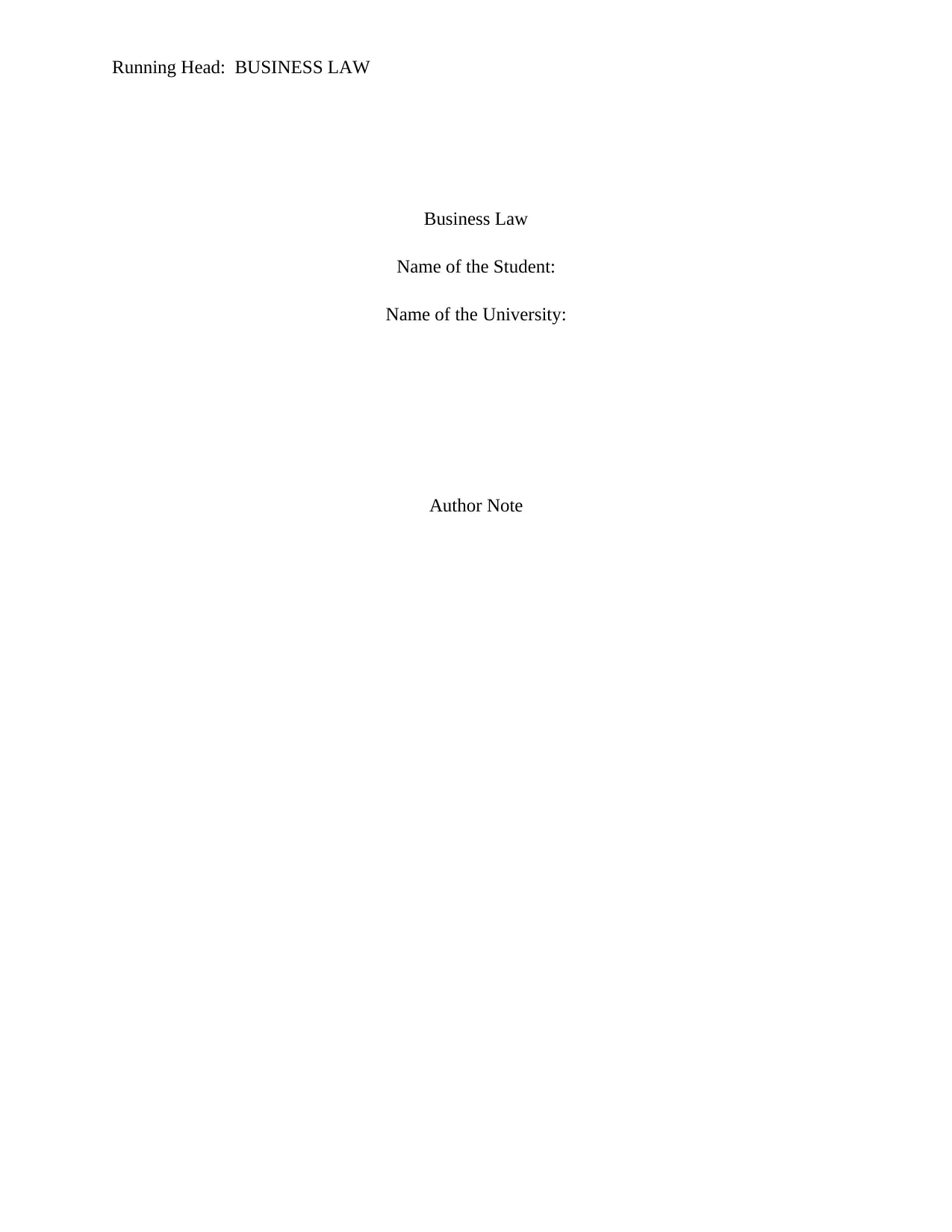
Running Head: BUSINESS LAW
Business Law
Name of the Student:
Name of the University:
Author Note
Business Law
Name of the Student:
Name of the University:
Author Note
Secure Best Marks with AI Grader
Need help grading? Try our AI Grader for instant feedback on your assignments.
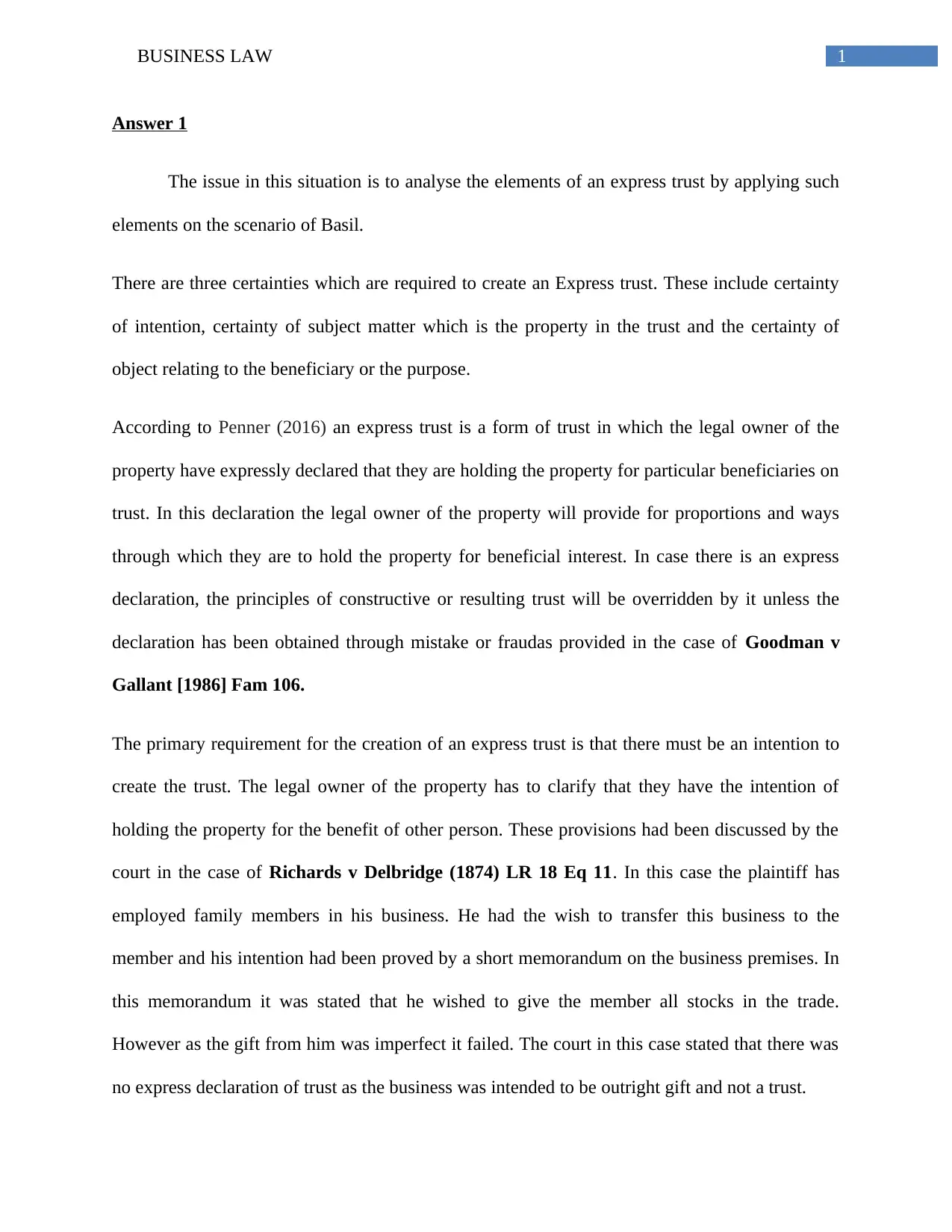
1BUSINESS LAW
Answer 1
The issue in this situation is to analyse the elements of an express trust by applying such
elements on the scenario of Basil.
There are three certainties which are required to create an Express trust. These include certainty
of intention, certainty of subject matter which is the property in the trust and the certainty of
object relating to the beneficiary or the purpose.
According to Penner (2016) an express trust is a form of trust in which the legal owner of the
property have expressly declared that they are holding the property for particular beneficiaries on
trust. In this declaration the legal owner of the property will provide for proportions and ways
through which they are to hold the property for beneficial interest. In case there is an express
declaration, the principles of constructive or resulting trust will be overridden by it unless the
declaration has been obtained through mistake or fraudas provided in the case of Goodman v
Gallant [1986] Fam 106.
The primary requirement for the creation of an express trust is that there must be an intention to
create the trust. The legal owner of the property has to clarify that they have the intention of
holding the property for the benefit of other person. These provisions had been discussed by the
court in the case of Richards v Delbridge (1874) LR 18 Eq 11. In this case the plaintiff has
employed family members in his business. He had the wish to transfer this business to the
member and his intention had been proved by a short memorandum on the business premises. In
this memorandum it was stated that he wished to give the member all stocks in the trade.
However as the gift from him was imperfect it failed. The court in this case stated that there was
no express declaration of trust as the business was intended to be outright gift and not a trust.
Answer 1
The issue in this situation is to analyse the elements of an express trust by applying such
elements on the scenario of Basil.
There are three certainties which are required to create an Express trust. These include certainty
of intention, certainty of subject matter which is the property in the trust and the certainty of
object relating to the beneficiary or the purpose.
According to Penner (2016) an express trust is a form of trust in which the legal owner of the
property have expressly declared that they are holding the property for particular beneficiaries on
trust. In this declaration the legal owner of the property will provide for proportions and ways
through which they are to hold the property for beneficial interest. In case there is an express
declaration, the principles of constructive or resulting trust will be overridden by it unless the
declaration has been obtained through mistake or fraudas provided in the case of Goodman v
Gallant [1986] Fam 106.
The primary requirement for the creation of an express trust is that there must be an intention to
create the trust. The legal owner of the property has to clarify that they have the intention of
holding the property for the benefit of other person. These provisions had been discussed by the
court in the case of Richards v Delbridge (1874) LR 18 Eq 11. In this case the plaintiff has
employed family members in his business. He had the wish to transfer this business to the
member and his intention had been proved by a short memorandum on the business premises. In
this memorandum it was stated that he wished to give the member all stocks in the trade.
However as the gift from him was imperfect it failed. The court in this case stated that there was
no express declaration of trust as the business was intended to be outright gift and not a trust.
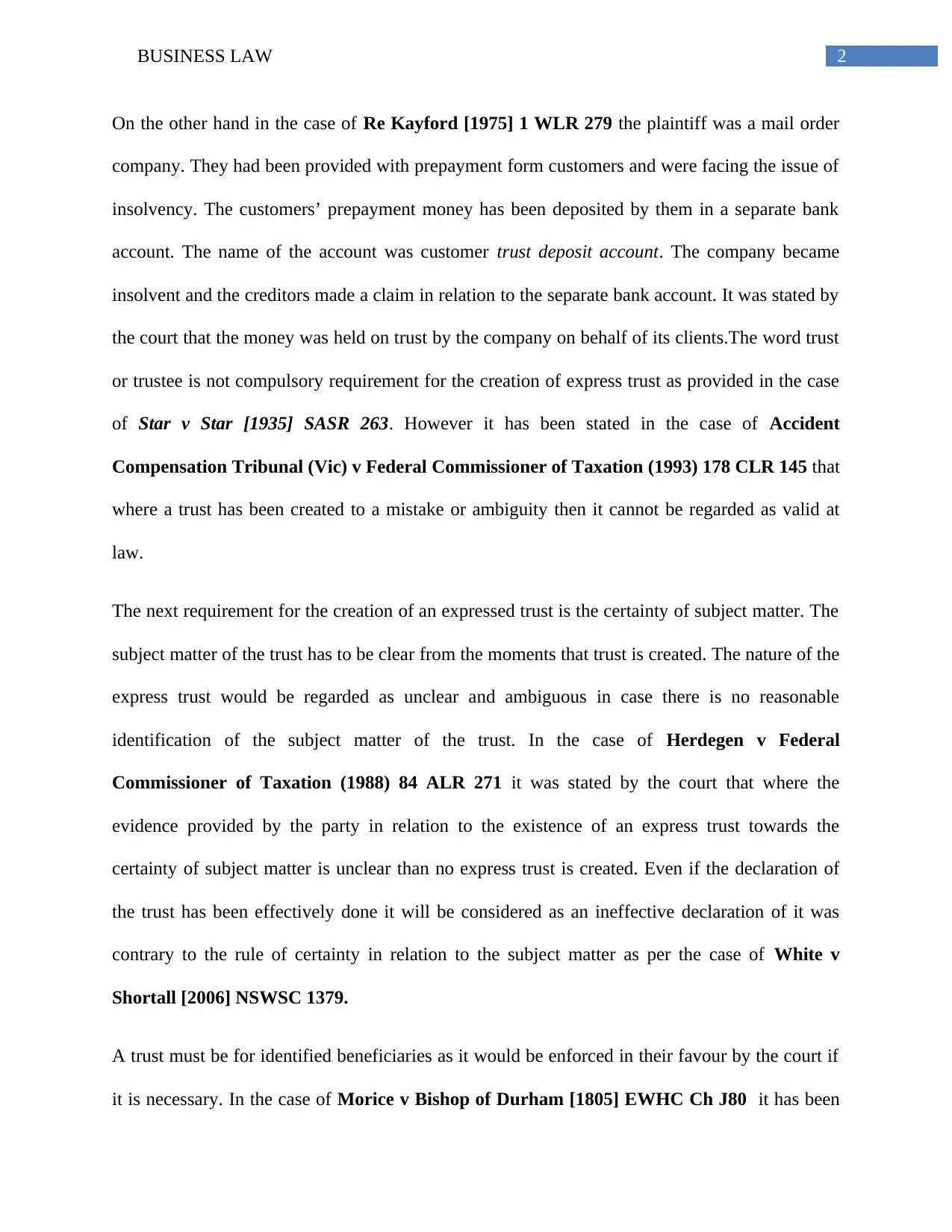
2BUSINESS LAW
On the other hand in the case of Re Kayford [1975] 1 WLR 279 the plaintiff was a mail order
company. They had been provided with prepayment form customers and were facing the issue of
insolvency. The customers’ prepayment money has been deposited by them in a separate bank
account. The name of the account was customer trust deposit account. The company became
insolvent and the creditors made a claim in relation to the separate bank account. It was stated by
the court that the money was held on trust by the company on behalf of its clients.The word trust
or trustee is not compulsory requirement for the creation of express trust as provided in the case
of Star v Star [1935] SASR 263. However it has been stated in the case of Accident
Compensation Tribunal (Vic) v Federal Commissioner of Taxation (1993) 178 CLR 145 that
where a trust has been created to a mistake or ambiguity then it cannot be regarded as valid at
law.
The next requirement for the creation of an expressed trust is the certainty of subject matter. The
subject matter of the trust has to be clear from the moments that trust is created. The nature of the
express trust would be regarded as unclear and ambiguous in case there is no reasonable
identification of the subject matter of the trust. In the case of Herdegen v Federal
Commissioner of Taxation (1988) 84 ALR 271 it was stated by the court that where the
evidence provided by the party in relation to the existence of an express trust towards the
certainty of subject matter is unclear than no express trust is created. Even if the declaration of
the trust has been effectively done it will be considered as an ineffective declaration of it was
contrary to the rule of certainty in relation to the subject matter as per the case of White v
Shortall [2006] NSWSC 1379.
A trust must be for identified beneficiaries as it would be enforced in their favour by the court if
it is necessary. In the case of Morice v Bishop of Durham [1805] EWHC Ch J80 it has been
On the other hand in the case of Re Kayford [1975] 1 WLR 279 the plaintiff was a mail order
company. They had been provided with prepayment form customers and were facing the issue of
insolvency. The customers’ prepayment money has been deposited by them in a separate bank
account. The name of the account was customer trust deposit account. The company became
insolvent and the creditors made a claim in relation to the separate bank account. It was stated by
the court that the money was held on trust by the company on behalf of its clients.The word trust
or trustee is not compulsory requirement for the creation of express trust as provided in the case
of Star v Star [1935] SASR 263. However it has been stated in the case of Accident
Compensation Tribunal (Vic) v Federal Commissioner of Taxation (1993) 178 CLR 145 that
where a trust has been created to a mistake or ambiguity then it cannot be regarded as valid at
law.
The next requirement for the creation of an expressed trust is the certainty of subject matter. The
subject matter of the trust has to be clear from the moments that trust is created. The nature of the
express trust would be regarded as unclear and ambiguous in case there is no reasonable
identification of the subject matter of the trust. In the case of Herdegen v Federal
Commissioner of Taxation (1988) 84 ALR 271 it was stated by the court that where the
evidence provided by the party in relation to the existence of an express trust towards the
certainty of subject matter is unclear than no express trust is created. Even if the declaration of
the trust has been effectively done it will be considered as an ineffective declaration of it was
contrary to the rule of certainty in relation to the subject matter as per the case of White v
Shortall [2006] NSWSC 1379.
A trust must be for identified beneficiaries as it would be enforced in their favour by the court if
it is necessary. In the case of Morice v Bishop of Durham [1805] EWHC Ch J80 it has been
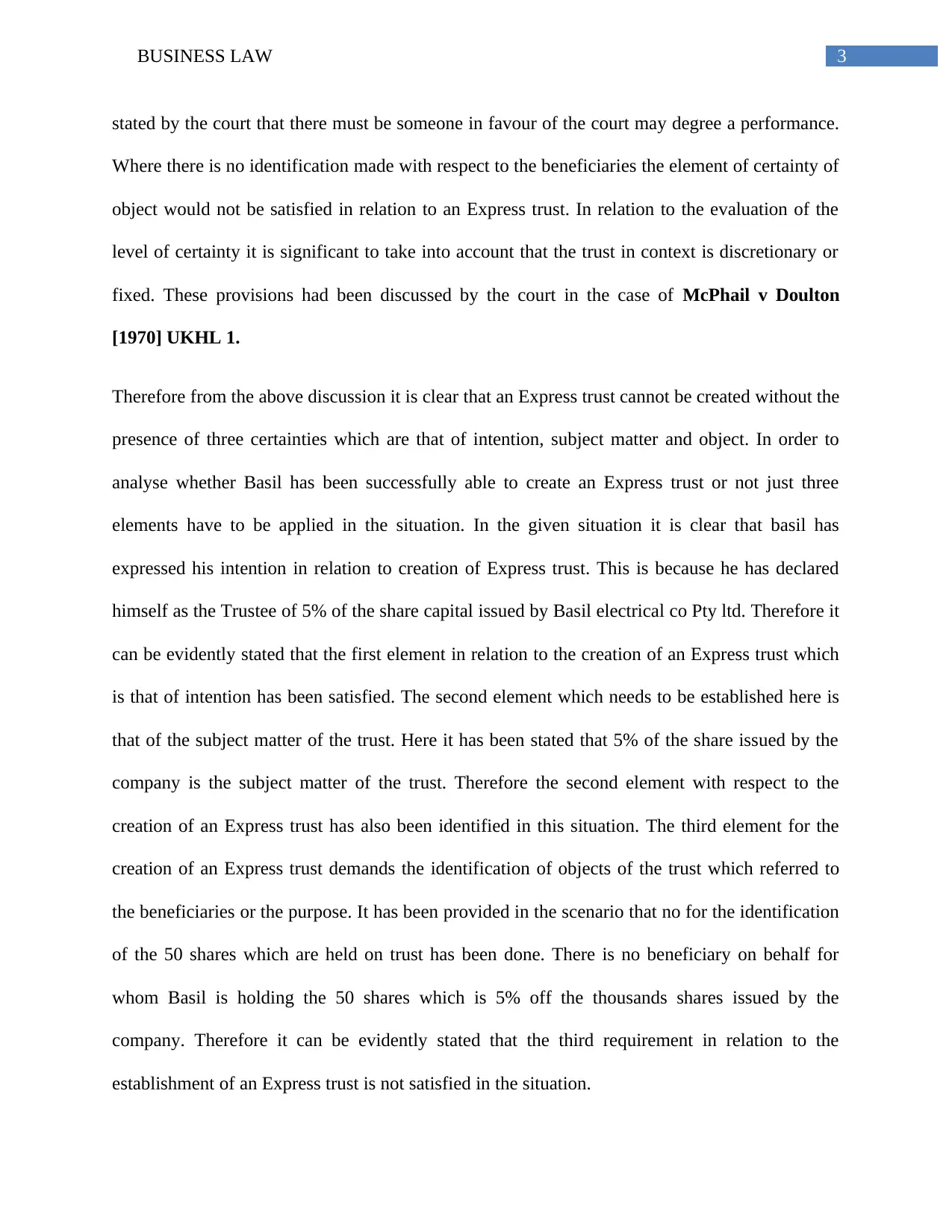
3BUSINESS LAW
stated by the court that there must be someone in favour of the court may degree a performance.
Where there is no identification made with respect to the beneficiaries the element of certainty of
object would not be satisfied in relation to an Express trust. In relation to the evaluation of the
level of certainty it is significant to take into account that the trust in context is discretionary or
fixed. These provisions had been discussed by the court in the case of McPhail v Doulton
[1970] UKHL 1.
Therefore from the above discussion it is clear that an Express trust cannot be created without the
presence of three certainties which are that of intention, subject matter and object. In order to
analyse whether Basil has been successfully able to create an Express trust or not just three
elements have to be applied in the situation. In the given situation it is clear that basil has
expressed his intention in relation to creation of Express trust. This is because he has declared
himself as the Trustee of 5% of the share capital issued by Basil electrical co Pty ltd. Therefore it
can be evidently stated that the first element in relation to the creation of an Express trust which
is that of intention has been satisfied. The second element which needs to be established here is
that of the subject matter of the trust. Here it has been stated that 5% of the share issued by the
company is the subject matter of the trust. Therefore the second element with respect to the
creation of an Express trust has also been identified in this situation. The third element for the
creation of an Express trust demands the identification of objects of the trust which referred to
the beneficiaries or the purpose. It has been provided in the scenario that no for the identification
of the 50 shares which are held on trust has been done. There is no beneficiary on behalf for
whom Basil is holding the 50 shares which is 5% off the thousands shares issued by the
company. Therefore it can be evidently stated that the third requirement in relation to the
establishment of an Express trust is not satisfied in the situation.
stated by the court that there must be someone in favour of the court may degree a performance.
Where there is no identification made with respect to the beneficiaries the element of certainty of
object would not be satisfied in relation to an Express trust. In relation to the evaluation of the
level of certainty it is significant to take into account that the trust in context is discretionary or
fixed. These provisions had been discussed by the court in the case of McPhail v Doulton
[1970] UKHL 1.
Therefore from the above discussion it is clear that an Express trust cannot be created without the
presence of three certainties which are that of intention, subject matter and object. In order to
analyse whether Basil has been successfully able to create an Express trust or not just three
elements have to be applied in the situation. In the given situation it is clear that basil has
expressed his intention in relation to creation of Express trust. This is because he has declared
himself as the Trustee of 5% of the share capital issued by Basil electrical co Pty ltd. Therefore it
can be evidently stated that the first element in relation to the creation of an Express trust which
is that of intention has been satisfied. The second element which needs to be established here is
that of the subject matter of the trust. Here it has been stated that 5% of the share issued by the
company is the subject matter of the trust. Therefore the second element with respect to the
creation of an Express trust has also been identified in this situation. The third element for the
creation of an Express trust demands the identification of objects of the trust which referred to
the beneficiaries or the purpose. It has been provided in the scenario that no for the identification
of the 50 shares which are held on trust has been done. There is no beneficiary on behalf for
whom Basil is holding the 50 shares which is 5% off the thousands shares issued by the
company. Therefore it can be evidently stated that the third requirement in relation to the
establishment of an Express trust is not satisfied in the situation.
Secure Best Marks with AI Grader
Need help grading? Try our AI Grader for instant feedback on your assignments.
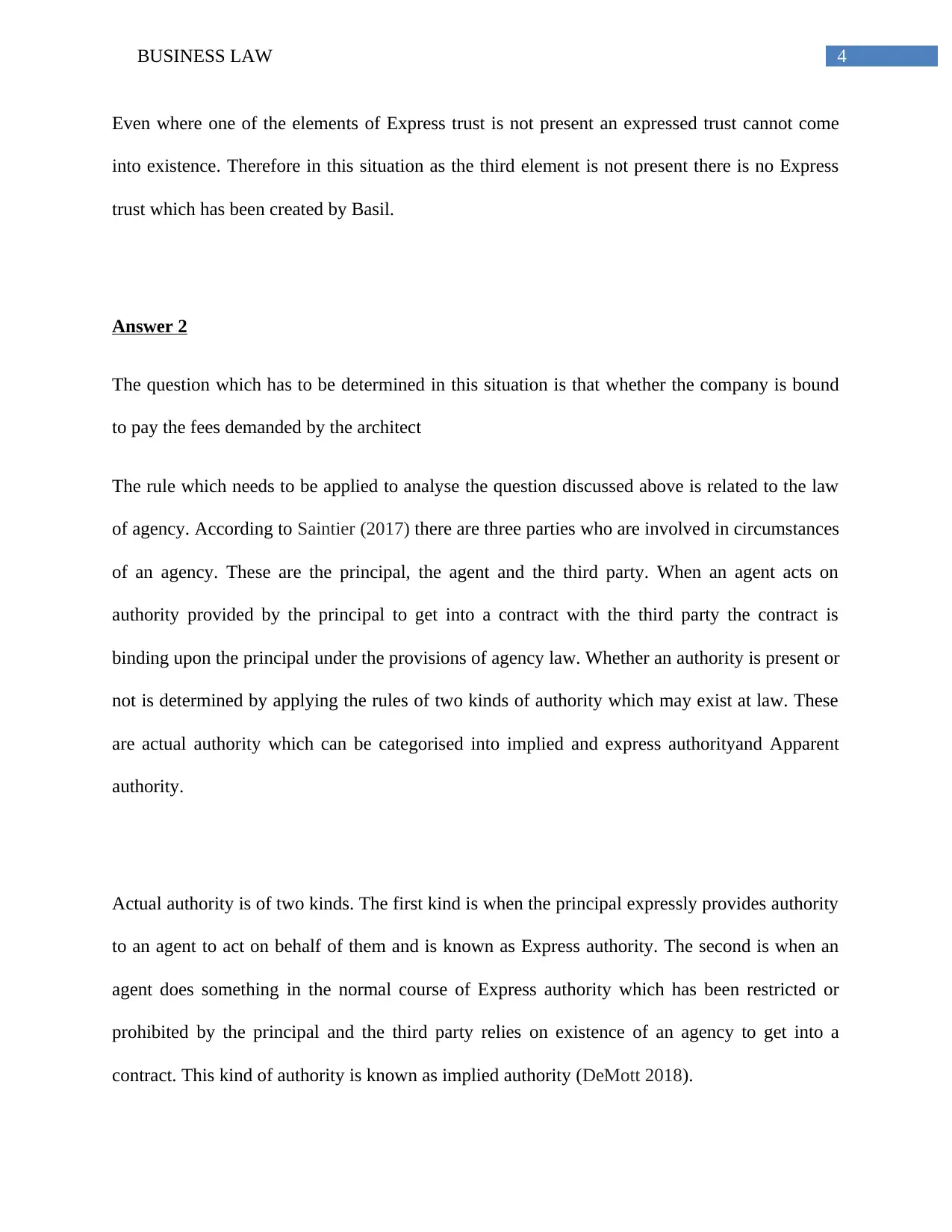
4BUSINESS LAW
Even where one of the elements of Express trust is not present an expressed trust cannot come
into existence. Therefore in this situation as the third element is not present there is no Express
trust which has been created by Basil.
Answer 2
The question which has to be determined in this situation is that whether the company is bound
to pay the fees demanded by the architect
The rule which needs to be applied to analyse the question discussed above is related to the law
of agency. According to Saintier (2017) there are three parties who are involved in circumstances
of an agency. These are the principal, the agent and the third party. When an agent acts on
authority provided by the principal to get into a contract with the third party the contract is
binding upon the principal under the provisions of agency law. Whether an authority is present or
not is determined by applying the rules of two kinds of authority which may exist at law. These
are actual authority which can be categorised into implied and express authorityand Apparent
authority.
Actual authority is of two kinds. The first kind is when the principal expressly provides authority
to an agent to act on behalf of them and is known as Express authority. The second is when an
agent does something in the normal course of Express authority which has been restricted or
prohibited by the principal and the third party relies on existence of an agency to get into a
contract. This kind of authority is known as implied authority (DeMott 2018).
Even where one of the elements of Express trust is not present an expressed trust cannot come
into existence. Therefore in this situation as the third element is not present there is no Express
trust which has been created by Basil.
Answer 2
The question which has to be determined in this situation is that whether the company is bound
to pay the fees demanded by the architect
The rule which needs to be applied to analyse the question discussed above is related to the law
of agency. According to Saintier (2017) there are three parties who are involved in circumstances
of an agency. These are the principal, the agent and the third party. When an agent acts on
authority provided by the principal to get into a contract with the third party the contract is
binding upon the principal under the provisions of agency law. Whether an authority is present or
not is determined by applying the rules of two kinds of authority which may exist at law. These
are actual authority which can be categorised into implied and express authorityand Apparent
authority.
Actual authority is of two kinds. The first kind is when the principal expressly provides authority
to an agent to act on behalf of them and is known as Express authority. The second is when an
agent does something in the normal course of Express authority which has been restricted or
prohibited by the principal and the third party relies on existence of an agency to get into a
contract. This kind of authority is known as implied authority (DeMott 2018).
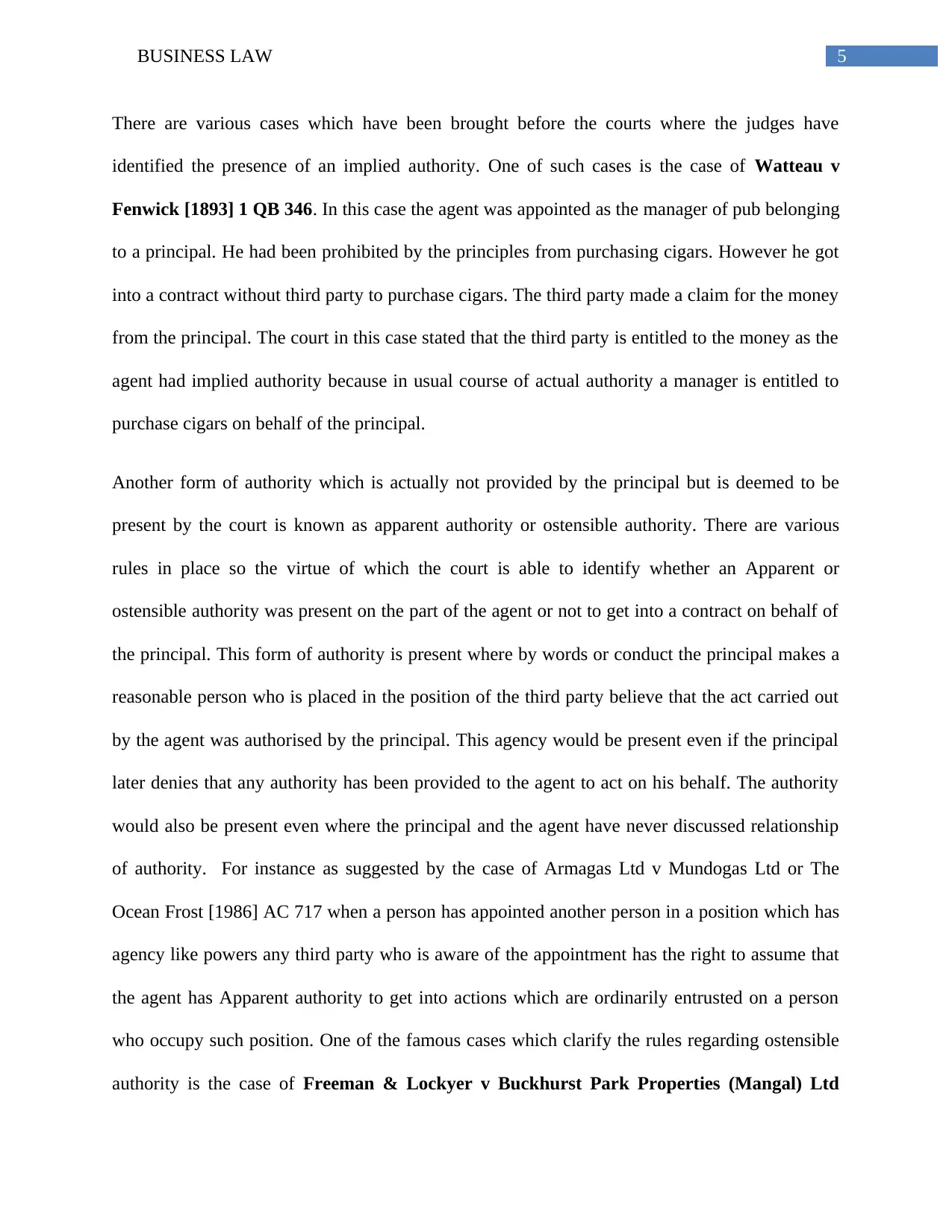
5BUSINESS LAW
There are various cases which have been brought before the courts where the judges have
identified the presence of an implied authority. One of such cases is the case of Watteau v
Fenwick [1893] 1 QB 346. In this case the agent was appointed as the manager of pub belonging
to a principal. He had been prohibited by the principles from purchasing cigars. However he got
into a contract without third party to purchase cigars. The third party made a claim for the money
from the principal. The court in this case stated that the third party is entitled to the money as the
agent had implied authority because in usual course of actual authority a manager is entitled to
purchase cigars on behalf of the principal.
Another form of authority which is actually not provided by the principal but is deemed to be
present by the court is known as apparent authority or ostensible authority. There are various
rules in place so the virtue of which the court is able to identify whether an Apparent or
ostensible authority was present on the part of the agent or not to get into a contract on behalf of
the principal. This form of authority is present where by words or conduct the principal makes a
reasonable person who is placed in the position of the third party believe that the act carried out
by the agent was authorised by the principal. This agency would be present even if the principal
later denies that any authority has been provided to the agent to act on his behalf. The authority
would also be present even where the principal and the agent have never discussed relationship
of authority. For instance as suggested by the case of Armagas Ltd v Mundogas Ltd or The
Ocean Frost [1986] AC 717 when a person has appointed another person in a position which has
agency like powers any third party who is aware of the appointment has the right to assume that
the agent has Apparent authority to get into actions which are ordinarily entrusted on a person
who occupy such position. One of the famous cases which clarify the rules regarding ostensible
authority is the case of Freeman & Lockyer v Buckhurst Park Properties (Mangal) Ltd
There are various cases which have been brought before the courts where the judges have
identified the presence of an implied authority. One of such cases is the case of Watteau v
Fenwick [1893] 1 QB 346. In this case the agent was appointed as the manager of pub belonging
to a principal. He had been prohibited by the principles from purchasing cigars. However he got
into a contract without third party to purchase cigars. The third party made a claim for the money
from the principal. The court in this case stated that the third party is entitled to the money as the
agent had implied authority because in usual course of actual authority a manager is entitled to
purchase cigars on behalf of the principal.
Another form of authority which is actually not provided by the principal but is deemed to be
present by the court is known as apparent authority or ostensible authority. There are various
rules in place so the virtue of which the court is able to identify whether an Apparent or
ostensible authority was present on the part of the agent or not to get into a contract on behalf of
the principal. This form of authority is present where by words or conduct the principal makes a
reasonable person who is placed in the position of the third party believe that the act carried out
by the agent was authorised by the principal. This agency would be present even if the principal
later denies that any authority has been provided to the agent to act on his behalf. The authority
would also be present even where the principal and the agent have never discussed relationship
of authority. For instance as suggested by the case of Armagas Ltd v Mundogas Ltd or The
Ocean Frost [1986] AC 717 when a person has appointed another person in a position which has
agency like powers any third party who is aware of the appointment has the right to assume that
the agent has Apparent authority to get into actions which are ordinarily entrusted on a person
who occupy such position. One of the famous cases which clarify the rules regarding ostensible
authority is the case of Freeman & Lockyer v Buckhurst Park Properties (Mangal) Ltd
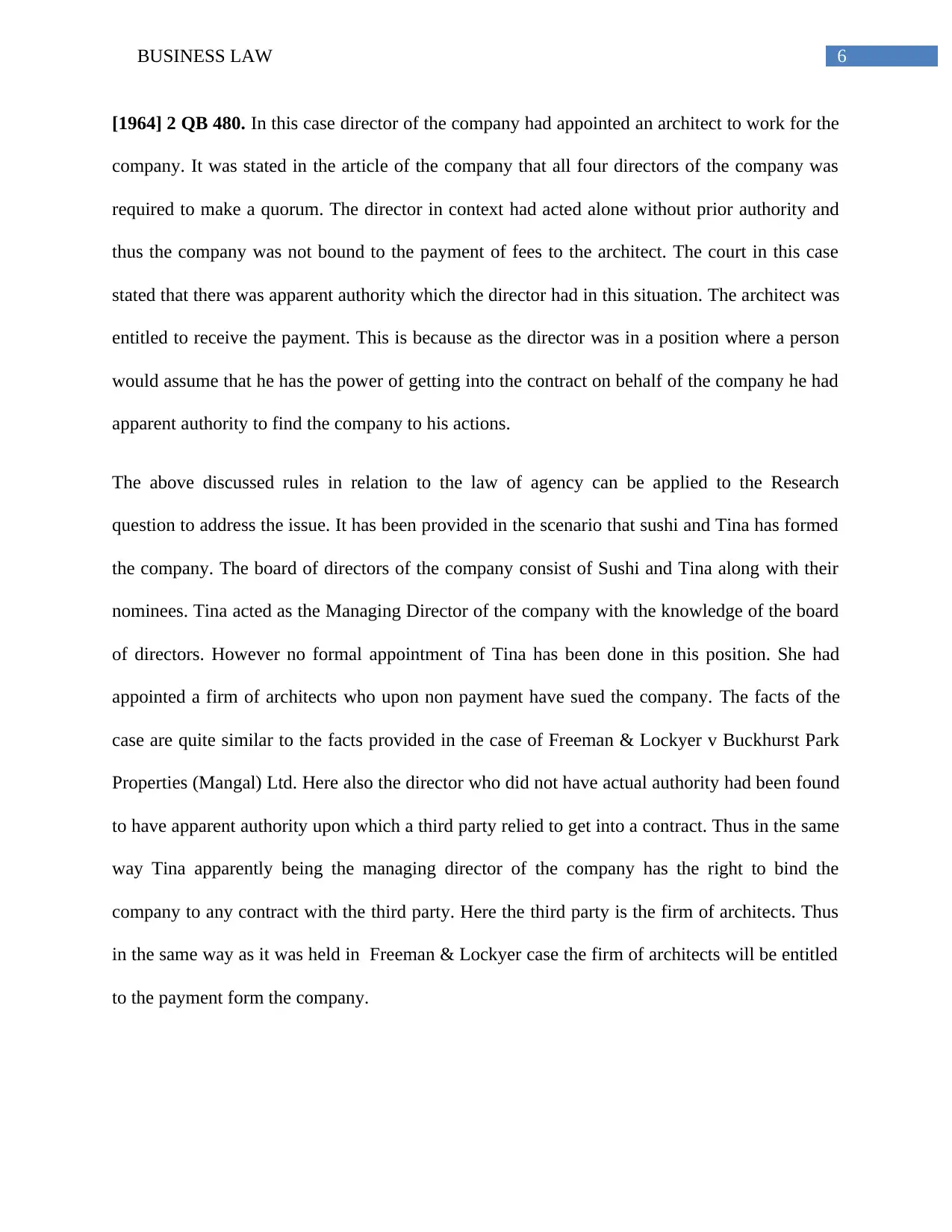
6BUSINESS LAW
[1964] 2 QB 480. In this case director of the company had appointed an architect to work for the
company. It was stated in the article of the company that all four directors of the company was
required to make a quorum. The director in context had acted alone without prior authority and
thus the company was not bound to the payment of fees to the architect. The court in this case
stated that there was apparent authority which the director had in this situation. The architect was
entitled to receive the payment. This is because as the director was in a position where a person
would assume that he has the power of getting into the contract on behalf of the company he had
apparent authority to find the company to his actions.
The above discussed rules in relation to the law of agency can be applied to the Research
question to address the issue. It has been provided in the scenario that sushi and Tina has formed
the company. The board of directors of the company consist of Sushi and Tina along with their
nominees. Tina acted as the Managing Director of the company with the knowledge of the board
of directors. However no formal appointment of Tina has been done in this position. She had
appointed a firm of architects who upon non payment have sued the company. The facts of the
case are quite similar to the facts provided in the case of Freeman & Lockyer v Buckhurst Park
Properties (Mangal) Ltd. Here also the director who did not have actual authority had been found
to have apparent authority upon which a third party relied to get into a contract. Thus in the same
way Tina apparently being the managing director of the company has the right to bind the
company to any contract with the third party. Here the third party is the firm of architects. Thus
in the same way as it was held in Freeman & Lockyer case the firm of architects will be entitled
to the payment form the company.
[1964] 2 QB 480. In this case director of the company had appointed an architect to work for the
company. It was stated in the article of the company that all four directors of the company was
required to make a quorum. The director in context had acted alone without prior authority and
thus the company was not bound to the payment of fees to the architect. The court in this case
stated that there was apparent authority which the director had in this situation. The architect was
entitled to receive the payment. This is because as the director was in a position where a person
would assume that he has the power of getting into the contract on behalf of the company he had
apparent authority to find the company to his actions.
The above discussed rules in relation to the law of agency can be applied to the Research
question to address the issue. It has been provided in the scenario that sushi and Tina has formed
the company. The board of directors of the company consist of Sushi and Tina along with their
nominees. Tina acted as the Managing Director of the company with the knowledge of the board
of directors. However no formal appointment of Tina has been done in this position. She had
appointed a firm of architects who upon non payment have sued the company. The facts of the
case are quite similar to the facts provided in the case of Freeman & Lockyer v Buckhurst Park
Properties (Mangal) Ltd. Here also the director who did not have actual authority had been found
to have apparent authority upon which a third party relied to get into a contract. Thus in the same
way Tina apparently being the managing director of the company has the right to bind the
company to any contract with the third party. Here the third party is the firm of architects. Thus
in the same way as it was held in Freeman & Lockyer case the firm of architects will be entitled
to the payment form the company.
Paraphrase This Document
Need a fresh take? Get an instant paraphrase of this document with our AI Paraphraser
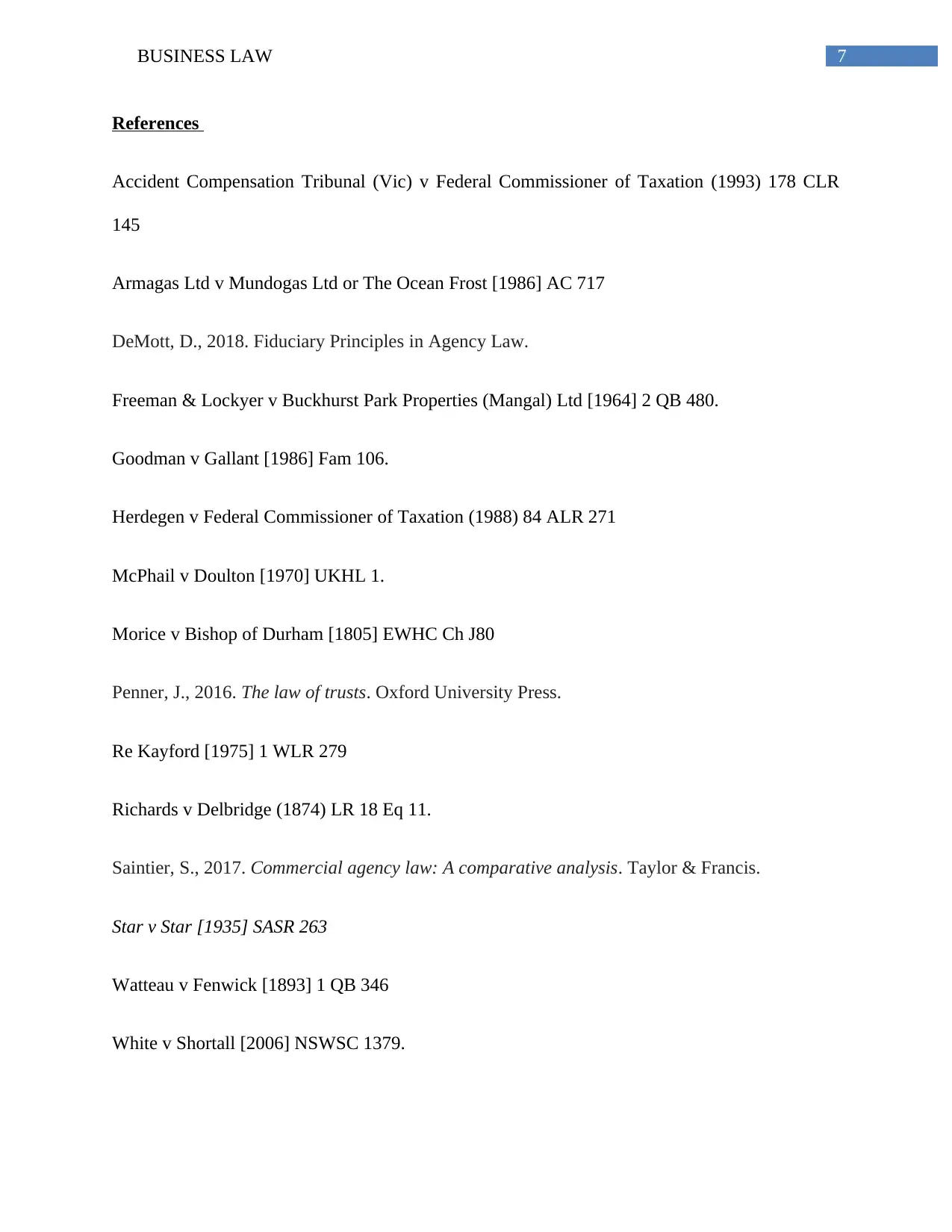
7BUSINESS LAW
References
Accident Compensation Tribunal (Vic) v Federal Commissioner of Taxation (1993) 178 CLR
145
Armagas Ltd v Mundogas Ltd or The Ocean Frost [1986] AC 717
DeMott, D., 2018. Fiduciary Principles in Agency Law.
Freeman & Lockyer v Buckhurst Park Properties (Mangal) Ltd [1964] 2 QB 480.
Goodman v Gallant [1986] Fam 106.
Herdegen v Federal Commissioner of Taxation (1988) 84 ALR 271
McPhail v Doulton [1970] UKHL 1.
Morice v Bishop of Durham [1805] EWHC Ch J80
Penner, J., 2016. The law of trusts. Oxford University Press.
Re Kayford [1975] 1 WLR 279
Richards v Delbridge (1874) LR 18 Eq 11.
Saintier, S., 2017. Commercial agency law: A comparative analysis. Taylor & Francis.
Star v Star [1935] SASR 263
Watteau v Fenwick [1893] 1 QB 346
White v Shortall [2006] NSWSC 1379.
References
Accident Compensation Tribunal (Vic) v Federal Commissioner of Taxation (1993) 178 CLR
145
Armagas Ltd v Mundogas Ltd or The Ocean Frost [1986] AC 717
DeMott, D., 2018. Fiduciary Principles in Agency Law.
Freeman & Lockyer v Buckhurst Park Properties (Mangal) Ltd [1964] 2 QB 480.
Goodman v Gallant [1986] Fam 106.
Herdegen v Federal Commissioner of Taxation (1988) 84 ALR 271
McPhail v Doulton [1970] UKHL 1.
Morice v Bishop of Durham [1805] EWHC Ch J80
Penner, J., 2016. The law of trusts. Oxford University Press.
Re Kayford [1975] 1 WLR 279
Richards v Delbridge (1874) LR 18 Eq 11.
Saintier, S., 2017. Commercial agency law: A comparative analysis. Taylor & Francis.
Star v Star [1935] SASR 263
Watteau v Fenwick [1893] 1 QB 346
White v Shortall [2006] NSWSC 1379.
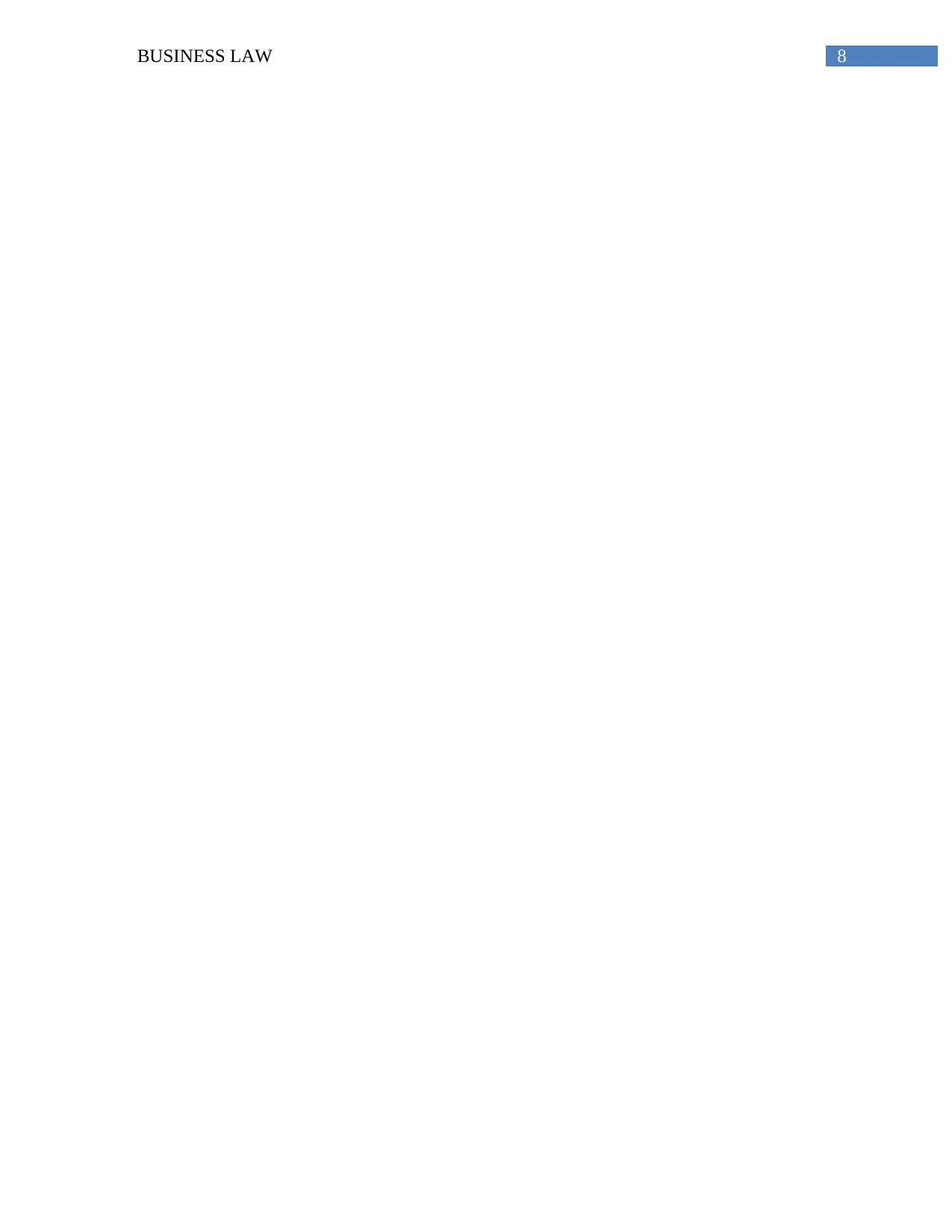
8BUSINESS LAW
1 out of 9
Related Documents
Your All-in-One AI-Powered Toolkit for Academic Success.
+13062052269
info@desklib.com
Available 24*7 on WhatsApp / Email
![[object Object]](/_next/static/media/star-bottom.7253800d.svg)
Unlock your academic potential
© 2024 | Zucol Services PVT LTD | All rights reserved.




